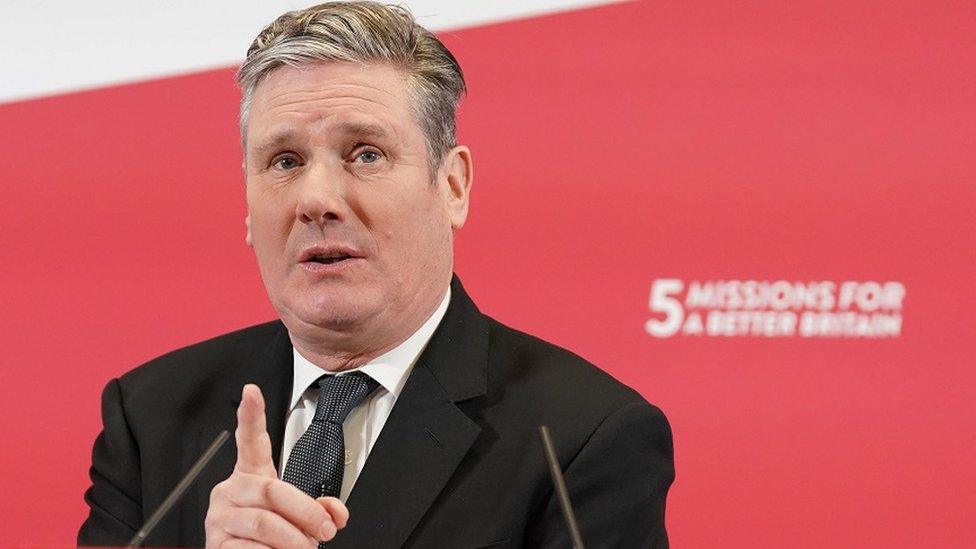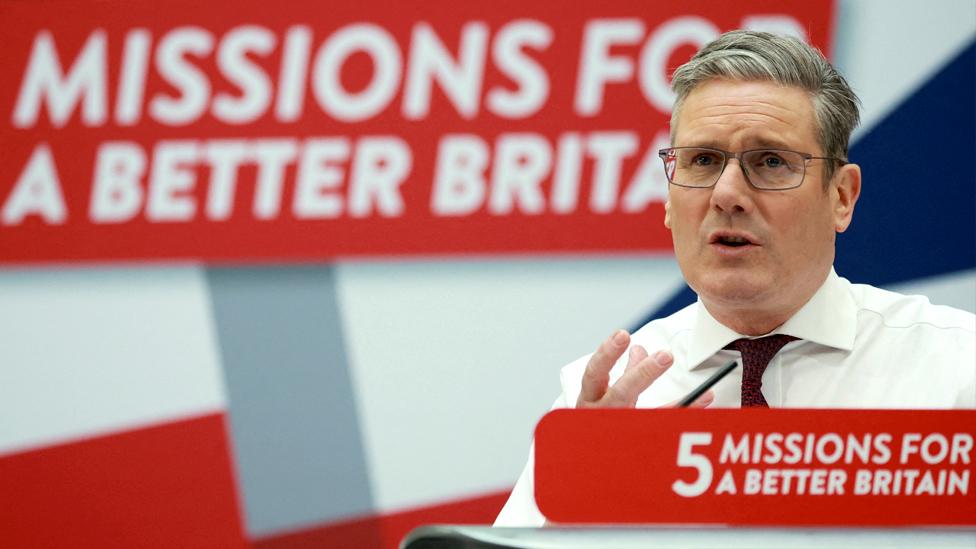Sir Keir Starmer says he's not talking down UK economy
- Published

Sir Keir Starmer has said he is not "talking down" Britain when warning that Poland is on course to overtake the UK within a decade in terms of the size of its economy per person.
The Labour leader was launching details of his party's "mission" to make the UK the fastest growing G7 economy.
He was speaking to business leaders and economists in the City of London.
Labour's analysis said Bulgaria and Romania could also overtake the UK if current trends continued until 2040.
Asked in a BBC interview if he was talking down the British economy, Sir Keir said: "No, I think what's talking down Britain is having absolutely no plan, burning through three prime ministers and four chancellors in one year.
"My main concern has been that we've got fantastic potential and talent and skills and innovation in Britain but we haven't got the growth that we need. We need a plan for growth, a strategy for growth."
Monday's announcement from Labour reveals a little bit more about the opposition's economic priorities. It will measure its G7 chart-topping growth mission on a per capita basis.
Labour explicitly says a "bad Brexit deal" is exacerbating the nation's economic challenges, calling for a "reset" to relations with Europe.
It canvases for ideas on both a closer relationship with Europe and the UK response to the US and Europe pouring investment into green and high tech businesses.
Asked to flesh out what Labour's "reset" in relations with the EU would mean in practice, Sir Kier reiterated that his party would not be rejoining the European Single Market or Customs Union, but did say he wanted to pursue "every opportunity" for trade deals with countries across the world.
He said Monday's Northern Ireland protocol deal would open the door to stronger post-Brexit relations with Europe, and that was one of the reasons he would lend Labour's votes to the PM to support the deal.
"I do think we need to reset that relationship with the EU and want to see the UK and EU have a better relationship than we've got now. And I do think that progress on the Protocol is a first step".
Labour announced last week that if elected, it would pursue five "missions": the first is for the UK to achieve the "highest sustained growth" in the G7.
The other missions - broad themes on what Labour wants to achieve in power - include turning the UK into a "clean energy superpower", improving the NHS, reforming the justice system and raising education standards.
The party has promised to provide more specific policy proposals later in the year.
"We've got to find the courage to take on vested interests," Sir Keir said in his speech earlier on Monday.
"So, if you think it's not government's role to shape markets, that we're only here to serve them; that a labour market which locks in low pay and productivity is something beyond reform; or that the planning system should favour the already wealthy, not the new houses, wind farms and laboratories we need to create more wealth… then that's not going to work for us," he said.
In the first indication of how the mission on the economy would be measured, Labour said it would look at growth in output per person and compare that to other countries.
Labour said the Tories had put the country on a "path of decline" and if recent growth trends continued, people in the UK would be worse off than Poland's population by 2030.
It said UK GDP per capita grew at an average annual rate of 0.5% in real terms between 2010 and 2021, while Poland's grew 3.6%, (based on World Bank data).
If those trends continued, by 2030 people in the UK would each be £500 ($600) poorer than Poland's population, Labour said, and by 2040 would have fallen behind Hungary and Romania.
It also plans to look at living standards via the measure of disposable income for the median UK household, with the ambition to make progress towards eliminating the gap between the median British family and those in France and Germany by the end of the parliament.
However Sir Keir also suggested he should be judged on whether people "feel better off" at the end of a Labour term in government.
Business target
Labour has been wooing the business community, suggesting it would provide long-term, stable government in contrast to last autumn's rapid change of Conservative prime ministers, and the disruption on the financial markets.
However, Sir Keir has previously said he supports the increase in corporation tax - from 19% to 25% - that is coming in April, arguing that businesses are more concerned about stability than taxes.
He has also previously promised sweeping constitutional reform, which he said would unleash potential in the nations and regions of the UK, and has said he would "make Brexit work".
Tesco chairman John Allan said: "Growth can best be achieved by a partnership between government and business. Now we need to work together to create a detailed plan so that if Labour form the next government, they can hit the ground running on day one."
Related topics
- Published23 February 2023
